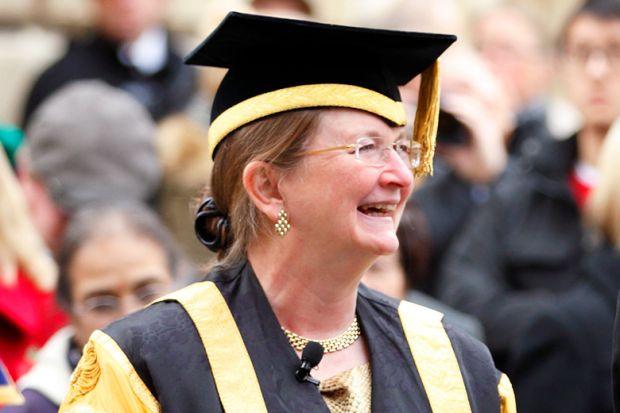The vice-chancellor of the University of Bath has announced that she will step down at the end of the academic year, following months of controversy over her salary, but faced further criticism over the terms of her departure.
Dame Glynis Breakwell, who is, on a remuneration package worth £468,000, the UK’s best-paid university leader, will stand down as vice-chancellor at the end of August 2018. She will then take a sabbatical for a semester “to further her academic research”, the university said, before retiring at the end of February 2019.
Dame Glynis said that she had “served the university to the best of my ability and will continue to do so until the day I leave office”.
But Sally Hunt, general secretary of the University and College Union, said that Dame Glynis’ position had become “untenable” and the vice-chancellor faced further criticism when it emerged that she would continue to receive her full salary until her retirement. She will also have a car loan of £31,000 written off.
In a joint statement, the University of Bath branches of the UCU, Unison and Unite unions said that the institution’s council had “learned nothing” from the anger over Dame Glynis’ pay.
“She will receive more than £600,000 from the university, an enormous reward for failure, and will continue to exercise the authority which has generated the 'climate of fear' now openly talked of on campus,” the unions said. “Professor Breakwell has lost our trust and our confidence: she must go now.”
Last week, Dame Glynis narrowly survived a vote of no confidence by the university’s senate, despite staff unanimously supporting a motion for her to resign.
The vote followed the publication of a critical report by the Higher Education Funding Council for England on 20 November into Bath’s governance surrounding the setting of pay for senior leaders.
The report criticised examples of “poor governance” and the “flawed” handling of a university court vote that blocked a motion censuring the university’s arrangements for determining executive pay.
In a statement announcing her departure, Dame Glynis highlighted the progress Bath had made since she was appointed vice-chancellor nearly 17 years ago.
“Since 2001, the university has changed dramatically. It has almost tripled in size and is now among the top universities in the UK,” she said. “It has had many great achievements in its first 51 years, and it will go on to be even greater. Over the next few months, I hope to have occasions to thank the many friends and colleagues who have made this possible during my time here.”
Dame Glynis has repeatedly come under fire for her salary after Times Higher Education revealed that her £451,000 pay and benefits package awarded in 2015-16 made her the UK’s highest-paid vice-chancellor. The case is back in the limelight again this month after it was revealed that her 2016-17 remuneration package rose to £468,000.
Thomas Sheppard, chair of Bath’s council, said Dame Glynis “has given outstanding service to the University of Bath, which has seen the university’s national and international profile grow enormously under her leadership”.
“She will continue to contribute to that ongoing success during her remaining months and through her academic work during her sabbatical,” she said. “This is the time for the university community as a whole to come together to face the opportunities and challenges of the future.”
Register to continue
Why register?
- Registration is free and only takes a moment
- Once registered, you can read 3 articles a month
- Sign up for our newsletter
Subscribe
Or subscribe for unlimited access to:
- Unlimited access to news, views, insights & reviews
- Digital editions
- Digital access to THE’s university and college rankings analysis
Already registered or a current subscriber? Login






